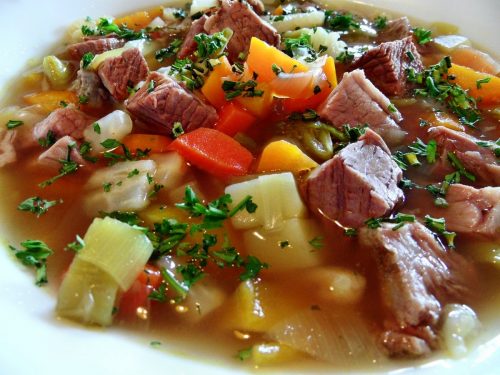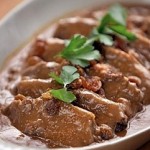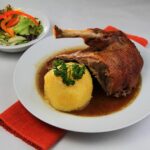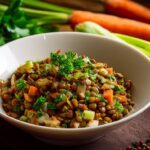
Pichelsteiner is a German stew that contains several kinds of meat and vegetables.
The creation of this dish has been traced to Auguste Winkler (née Kiesling). Originally from Kirchberg im Wald, she worked as an innkeeper in Grattersdorf, where she is also buried. The name is likely to have derived from the nearby Büchelstein mountain, where the annual Büchelsteiner Fest has been celebrated since 1839. As early as the 40th anniversary in 1879, the Open-air-cooking festival was considered a tradition, and because the letter ü is pronounced like i in the local dialect, the dish’s name developed.
In Regen, a town in the Bavarian Forest, the citizens have met annually since 1874 on Kirchweih Monday to eat Pichelsteiner together, a tradition that is still alive today. They also claim the name’s etymology. In their opinion it derives from the pot in which the stew is cooked, which was called a pichel in the past, but this version is highly questioned by Bavarian researcher Max Peinkofer.
The dish was first mentioned in a cookbook in 1894.
Ingredients:
- 200 g boneless lamb shoulder
- 200 g boneless beef chuck
- 200 g boneless pork from belly
- 4 teaspoons butter or lard
- 1 quart vegetable broth
- 3 large carrots
- 1-1/2 cups green or savoy cabbage
- 1 cup celeriac
- 1 cup leeks
- 1 cup celery
- 1 cup parsnips
- 1 cup kohlrabi
- 1/2 cup chopped onions
- salt and black pepper
- 3-4 tbs parsley
- 3 medium cut potatoes, optional
- 1/2 cup crème fraiche, optional
Preparation:
-
Peel and cut the vegetable into finger-thick chunks. Cut all the meat into 2 cm thick cubes. In a big skillet brown the meat on all sides; scrape the brown parts from pan; set aside.
-
Saute the onions until brown and set aside. Saute the vegetables and set aside.
-
Now put all ingredients in a big pot, in layers one by one, sprinkling each layer with salt and pepper. First the meat, then the onions, then the vegetables, then the potatoes, if used.
-
Pour the vegetable broth over the top. Bring to a boil over high heat, then reduce the heat to its lowest level and cover the pot tightly. Let the stew simmer for 1 1/2 hours without stirring.
-
Serve directly out of the pot.







